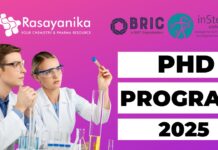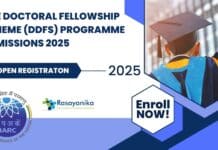JRF available at IISER Mohali
Applications are invited for Junior Research Fellow (JRF) on contract basis to work on a DST sponsored project (DST/INSPIRE/04/2020/002347)
Position: Junior Research Fellow
No.of Posts: 01
Project name: “Development of Molecular Catalyst for Electrocatalytic Carbon Dioxide Reduction”.
Working Area: Bioinorganic, electrocatalysis
Duration: Initially for six months with a possibility of extension (two years or till the end of the project whichever is earlier) based on satisfactory performance of the candidate and availability of funds.
Essential Qualification: MSc in Chemistry (minimum 55% or equivalent CGPA) and candidate should have qualified CSIR-UGC-NET including JRF, LS and/or GATE or equivalent national level exams.
Salary: Rs. 31000.00 + 8% HRA (No accommodation will be provided)
Application Deadline: 03/07/2023
Application Procedure: Interested candidates should email their CV to Dr. Suman K. Barman ([email protected]) on or before 3rd July 2023
Interview: Shortlisted candidates will be notified via email for the online interview (date and time of interview will be notified via email)
Once offered, candidates must join in person for the fellowship to be effective.
Interested for this position? If yes here are few interview questions with answers for JRF available at IISER Mohali
1. Can you provide an overview of your educational background and relevant research experience?
Answer: I hold an MSc degree in Chemistry with a specialization in Bioinorganic studies. During my academic journey, I focused on electrocatalysis and gained hands-on experience in the field through various laboratory courses and research projects. I have also worked on projects related to the development of molecular catalysts for electrocatalytic reactions, which aligns well with the focus of this position.
2. Have you participated in any national-level exams such as CSIR-UGC-NET, JRF, LS, or GATE? If so, please explain your qualification and performance for JRF available at IISER Mohali.
Answer: Yes, I have qualified the CSIR-UGC-NET examination, which includes JRF and LS categories. I achieved a commendable rank in the examination, demonstrating my understanding and knowledge in the field of chemistry. Additionally, I have also appeared for the GATE examination and obtained a good score, further highlighting my aptitude for research and academic pursuits.
3.Could you elaborate on any prior experience you have in the field of electrocatalytic carbon dioxide reduction?
Answer: During my MSc program, I had the opportunity to work on a research project that involved investigating electrocatalytic carbon dioxide reduction. I collaborated with a team of researchers to explore novel catalysts and experimental setups, aiming to enhance the efficiency of the reduction process. This experience has equipped me with a solid foundation in this area and a deep understanding of the challenges and potential solutions.
4.How do you plan to contribute to the development of molecular catalysts for electrocatalytic carbon dioxide reduction?
Answer: I believe my strong theoretical knowledge in chemistry, particularly in the field of bioinorganic studies and electrocatalysis, will be valuable in this project. I intend to utilize my understanding of catalyst design principles and electrochemical techniques to contribute to the development and optimization of efficient molecular catalysts for carbon dioxide reduction. I also plan to stay updated with the latest research and collaborate with fellow researchers to explore innovative approaches.
5. How do you handle challenges and setbacks in a research environment?
Answer: In a research environment, challenges and setbacks are common, and I approach them with a positive mindset. I see setbacks as learning opportunities and avenues for improvement. When faced with challenges, I analyze the situation, seek guidance from mentors or colleagues, and brainstorm potential solutions. I am resilient, adaptable, and always open to exploring alternative strategies. I believe that perseverance and a systematic approach are crucial for overcoming obstacles and achieving research goals.
Check out Rasayanika for more job updates.

















































